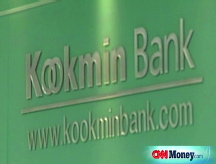Bonds jump, dollar rises as Wall Street buckles
Treasurys spike after Lehman Brothers declare bankruptcy. Dollar gains against the euro and yen.
NEW YORK (CNNMoney.com) -- Treasury prices rallied sharply Monday after Lehman Brothers announced it will file for bankruptcy, sending a jolt of insecurity through Wall Street. The dollar gained ground against the euro.
Adding further anxiety to the market, Bank of America (BAC, Fortune 500) and Merrill Lynch (MER, Fortune 500) were finalizing a merger, and American International Group (AIG, Fortune 500) was scrambling for capital.
The benchmark 10-year note surged 2-7/32 to 104 16/32 and its yield slid to 3.45% from 3.72% late Friday. Bond prices and yields move in opposite directions.
The 30-year bond rose 3 14/32 to 106 14/32 and its yield slid to 4.12% from 4.31%. The 2-year note gained 28/32 to 101 5/32 and its yield fell to 1.75% from 2.21%.
Dollar gets a boost: The dollar strengthened Monday, boosted by the volume of investors looking to get their assets into U.S. Treasurys.
The 15-nation euro cost $1.4275, down from $1.4346. The British pound bought $1.7988, down from $1.8052 Friday.
Against the Japanese yen, however, the dollar fell slightly to ¥105.44, down from ¥105.52.
"In times of uncertainty, traders turn back to basics," said Gareth Sylvester, Senior currency strategist at HIFX in San Francisco.
Investors were looking for the safest place for their investments."What we are seeing is a very low-risk tolerance," said Sylvester, and so as investors rush to Uncle Sam, "you have to sell your foreign investments and buy back the U.S. dollar."
As Wall Street's struggles reverberated through international markets, foreign central banks moved to reassure their own markets by adding money supplies to their economies.
Central banks add supply to their national economies on a regular basis, and the injection could affect the economy in two ways. The shot of supply could weaken the currency, but the move could also work to comfort the market and "could ultimately help buoyancy," explained Sylvester.
Flight to safety: Investors often move their assets to government bonds as a flight to safety when other markets are perceived as more risky. As major Wall Street financial institutions weaken, rattling market confidence, investors rush to put their funds with Uncle Sam. The increase in demand for Treasurys pushes prices up.
Bond prices are "soaring" as investors are "pulling out of equities and going into the bond market," said Peter Cardillo, chief market economist at Avalon Partners. The "news about Merrill and Lehman and AIG is obviously behind it," he said.
"People are trying to get completely defensive," said William Larkin, portfolio manager at Cabot Money Management. The companies that have been in the headlines "were perceived to be fairly safe investments," he said, and "people are concerned about the domino effect."
Investors were willing to pay for safety, said Larkin. "When the rules are changing, it is better to be on the sidelines."
From Fannie Mae and Freddie Mac last week to Lehman Brothers and Merrill, recent events in the market are unprecedented. "Everybody is trying to figure out what is going to happen," said Larkin.
Lehman Brothers (LEH, Fortune 500) announced a $4 billion third-quarter loss on Wednesday, and Wall Street executives and federal regulators worked through the weekend in an attempt to hatch a plan to salvage the 158-year-old investment bank.
But in the wee hours of Monday, Lehman's fate was sealed when the company announced it would file for bankruptcy.
During the weekend, in efforts to calm nerves, the Federal Reserve announced plans to ease lending restrictions to the banking industry. Additionally, a group of 10 leading domestic and foreign banks agreed to create a $70 billion fund to lend to troubled financial firms.
Bank of America announced that it will purchase Merrill Lynch, the 94-year old investment firm, for about $50 billion. The purchase price would value the company at about $29 a share, a 70% premium based upon Friday's closing price.
American International Group has lost more than $18 billion in the past nine months and has reached out to the Federal Reserve requesting a $40 billion bridge loan, according to reports.
The New York State Insurance Department will allow AIG to access $20 billion of its assets, said New York Gov. David Paterson. And the governor pushed the Federal Reserve to assist AIG in obtaining however much capital the company needs. ![]()





